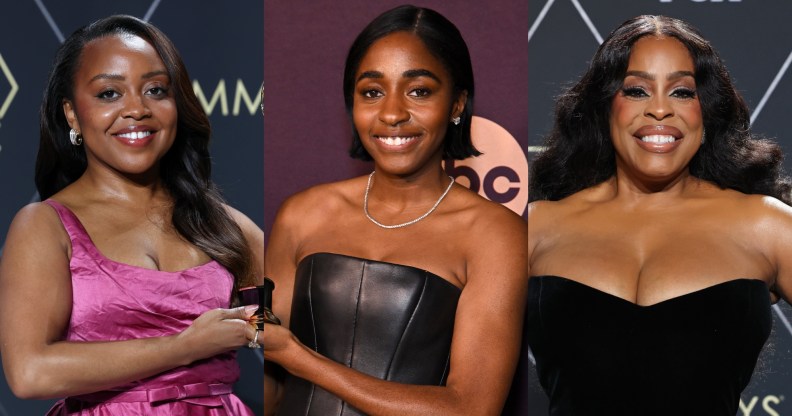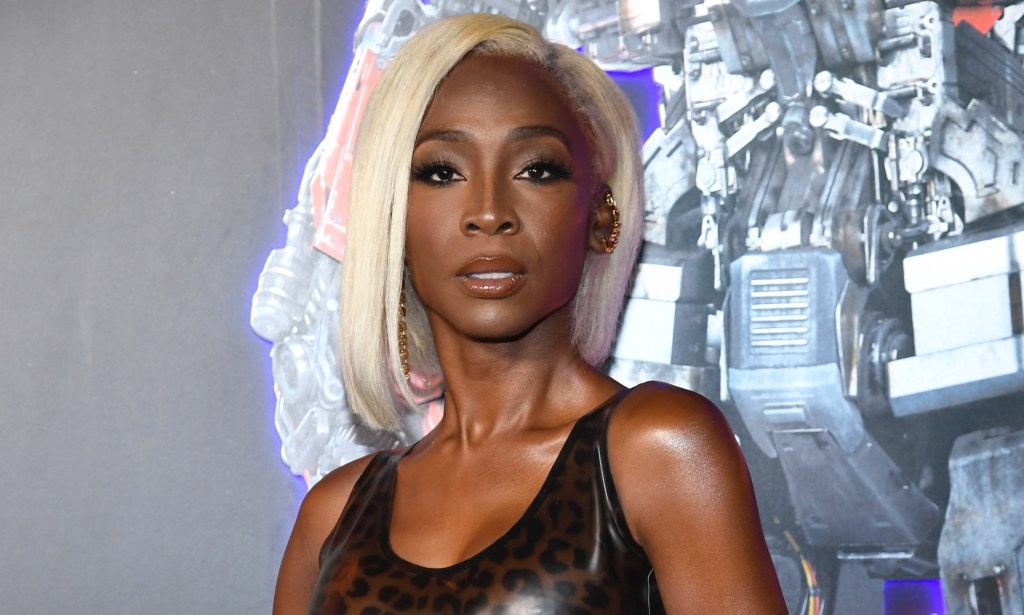Black women had a historic Emmys night – but it shouldn’t paper over Hollywood’s diversity issues

Quinta Brunson (L), Ayo Edebiri and Niecy Nash-Betts (R) are blazing a trail in the TV industry. (Getty)
The 2024 Emmy Awards, which took place on Monday (16 January), saw landmark wins for industry stars Ayo Edebiri, Quinta Brunston and Niecy Nash Betts – but the momentum must be kept up when it comes to properly recognising Black talent on the biggest stages.
The 75th Primetime Emmy Awards (delayed due to the Hollywood strikes) celebrated the best of US television from June 2022 to May 2023. A standout year saw major hits such as HBO’s The Last Of Us enjoy an acclaimed arrival while their flagship drama Succession bade an emotional farewell.
Other notable shows that made waves inside and out the LGBTQ+ community included Only Murders in the Building (starring the icon herself Meryl Streep), Ted Lasso (who can forget absolute mother Hannah Waddingham) and Natasha Lyonne’s gritty debut as unconventional detective Charlie Cale in Peacock’s Poker Face.
Amidst stiff competition, one show shone through in the form of Disney+’s comedy-drama The Bear, which charts the high-stakes drama and dynamics of a local Chicago sandwich shop. The series ultimately swept up a whopping 10 Emmys.
Notably, the star-studded ceremony saw Bottoms‘ Ayo Edebiri pick up her third high-profile award for her role in The Bear as chef Sydney as Outstanding Supporting Actor In A Comedy Series.

The fast-rising queer icon became the third Black woman to take home the coveted award in Emmy history. She follows in the footsteps of Sheryl Lee Ralph for Abbot Elementary in 2022 and prior to that, shockingly, Jackée Harry for 227, all the way back in 1987.
In the Outstanding Lead Actor in a Comedy Series category, Abbott Elementary‘s Quinta Brunson became the second Black actress to win in the category, following Isabel Sanford’s win for The Jefferson in 1981, 43 years ago. Yes, you read that correctly.
Brunson and Edebiri’s combined win marks the first time both categories have been won by a Black actress in the same year.
Finally, LGBTQ+ icon Niecy Nash-Betts landed Outstanding Supporting Actress in a Limited Series for her starring role as neighbour Glenda Cleveland in Ryan Murphy’s controversial Netflix series Monster: The Jeffrey Dahmer Story.
During Nash-Betts’ acceptance speech, the actor delivered a particularly impactful message addressing the systemic inequality Black women face in the US to this day within the policing system.
“I accept this award on behalf of every Black and Brown woman who have gone unheard, yet over-policed, like Glenda Cleveland, like Sandra Bland, like Breonna Taylor!” she exclaimed on stage.
The importance of these victories cannot be understated, not only for the LGBTQ+ community (with two queer women and a fierce ally at the helm of these wins) but for racial diversity within the industry.
The past few years has seen major inequalities faced by Black women brought to the fore, whether due to the #MeToo wave, the Black Lives Matter movement or the latest Hollywood strikes, which emboldened actors to speak up about their negative experiences.
American Horror Story star Angelica Ross announced her exit from Hollywood after Ryan Murphy allegedly axed an all-Black season of the hit FX series. She later opened up about the alleged transphobia and anti-Blackness that she experienced on set which she said further spurred her decision.

More recently, The Color Purple star Taraji P. Henson has opened up about the constant difficulties she has encountered trying to be paid fairly within the industry.
As for representation within TV shows and films, there is still a long way to go. LGBTQ+ shows have seen a swathe of cancellations, especially those centring queer women of colour. Last year saw a particular blow for representation with the loss of shows such as Amazon Prime’s A League of Their Own, Disney+’s Willow and Paramount+’s iCarly.
Unfortunately this chronic issue doesn’t look to be getting better if the film industry is anything to go by. At the beginning of 2024, a report by USC Annenberg’s Inclusion Initiative looked into diversity within the film industry for women and people of colour, producing stark results.
The report found inclusion initiatives were often “performative acts” with no “real steps towards fostering change.” Among the four women of colour who directed a top-100 grossing film in 2023, The Marvels featured the only Black female director, Nia DaCosta. The figures show no significant increase from 2022.
The pervasive systemic issues within Hollywood mean that while we should definitely celebrate these wins when they come along, we can’t afford to become complacent.
Otherwise we risk waiting another four decades to celebrate the next milestone.

